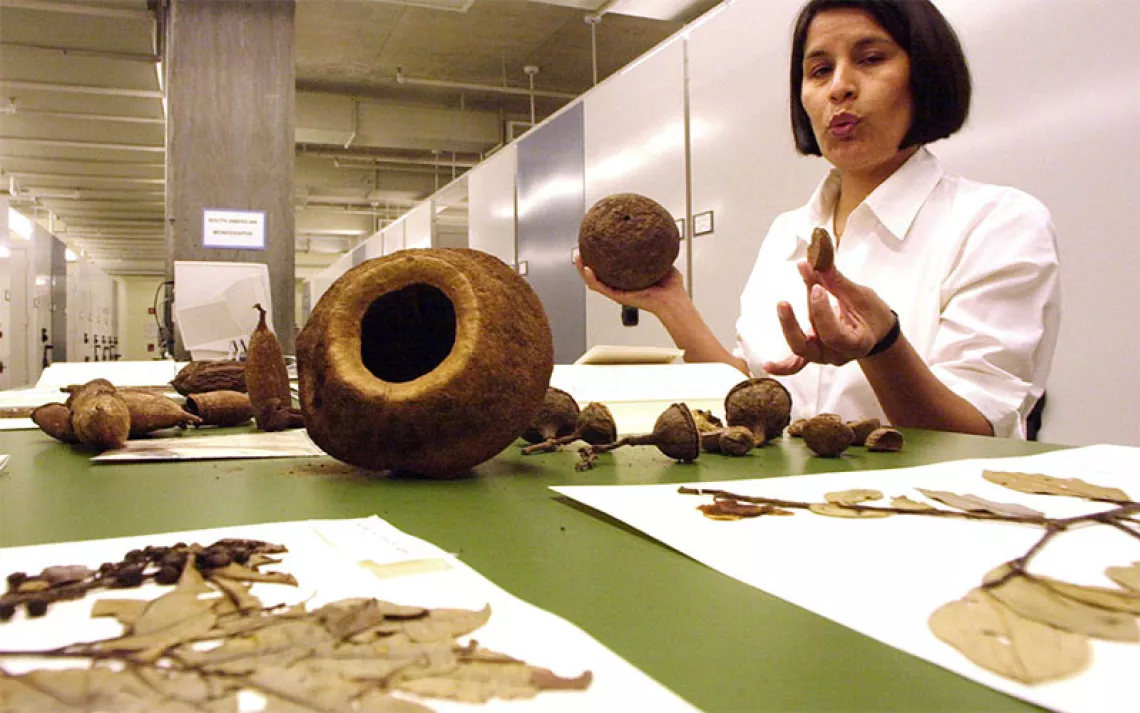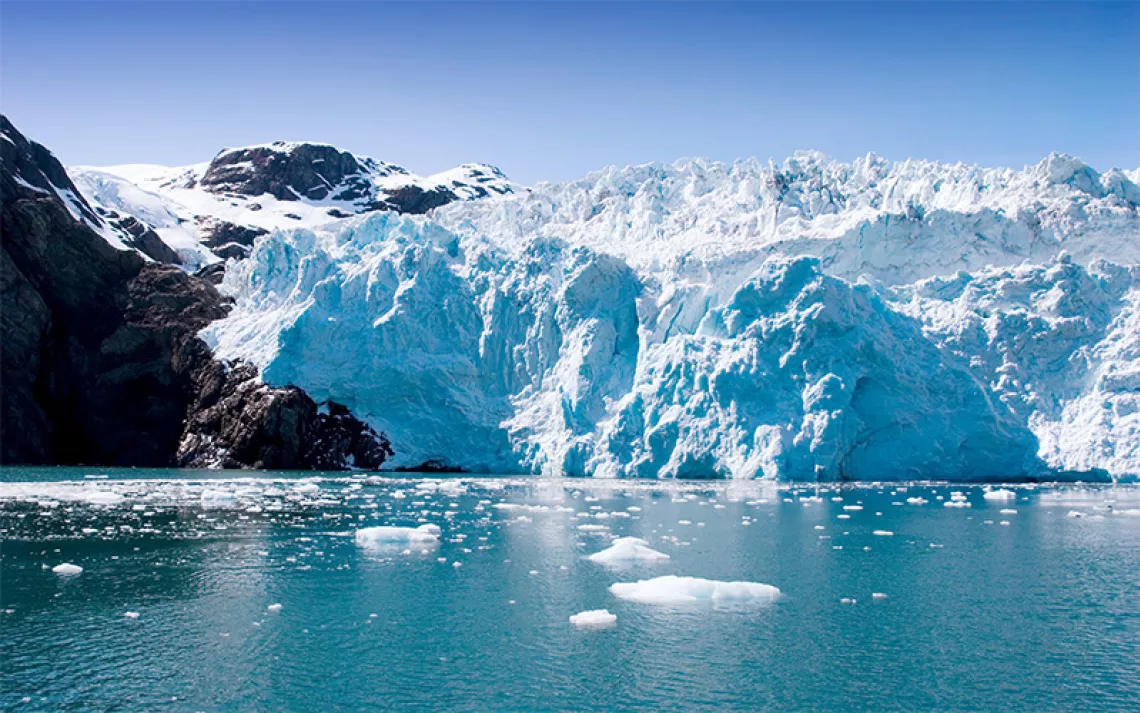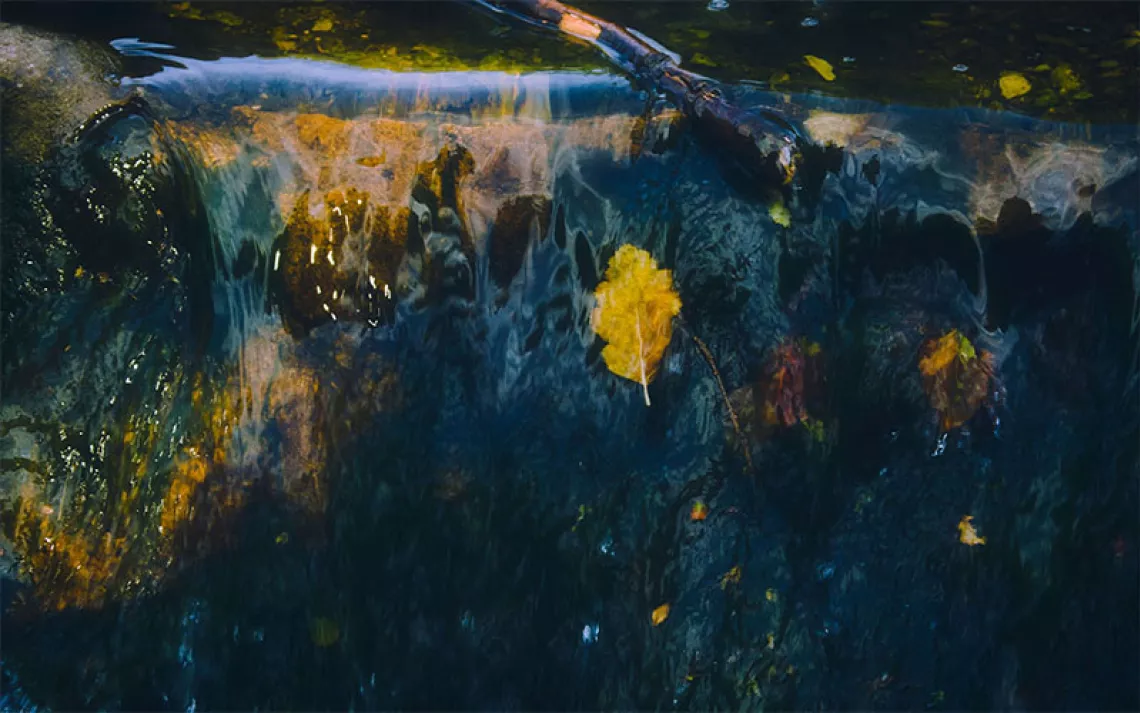Dispatch From the Path of Totality
Witnessing a big eclipse on a small farm (spoiler alert: there was no electronica)
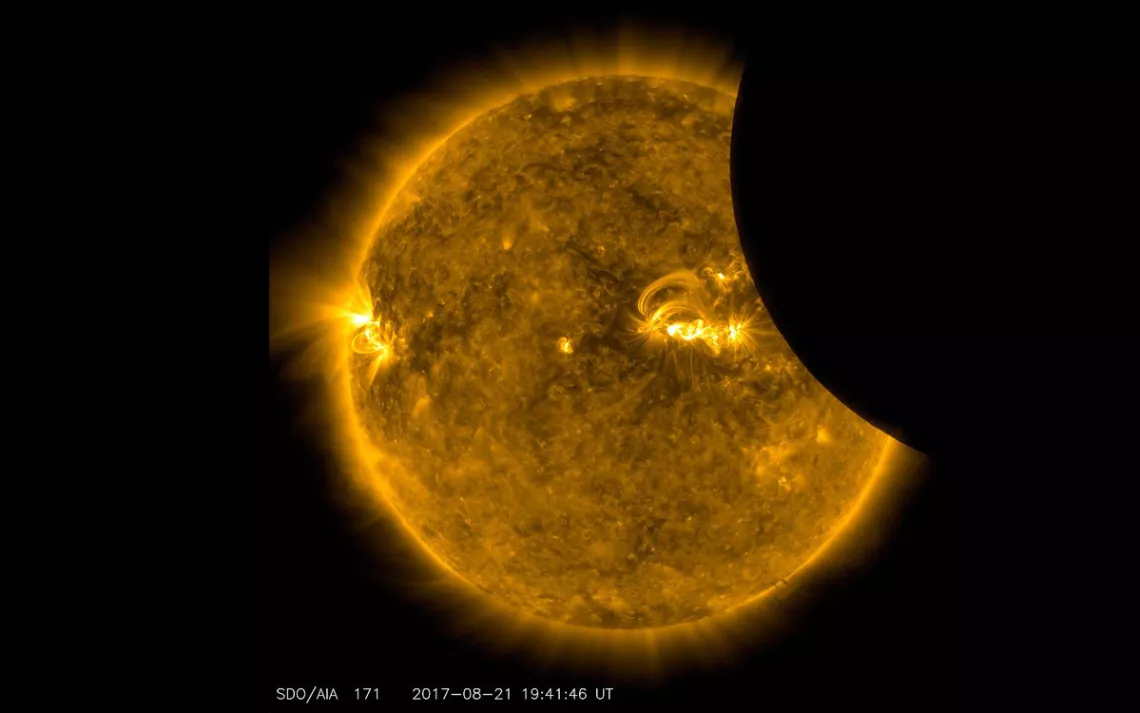
Image of the Moon transiting across the Sun, taken by SDO in 171 angstrom extreme ultraviolet light on Aug. 21, 2017. Photo by NASA/SDO.
It was going to be awesome. Like Burning Man but better. When Ann and Dave Shapiro bought their tickets for the Oregon Eclipse Festival last January, the event was supposed to total about 10,000 people. By the time they took their place early Wednesday evening in a long line of cars winding up into the Ochoco Mountains, it had grown to 40,000. At midnight, someone drove by in the opposite direction and said they had five more hours to wait. Their one-and-a-half-year-old was screaming. They bailed, got a hotel room in Madras, and tried again the next morning. But by then the line of cars was even longer, and they estimated it would be at least a 15-hour wait to be admitted to the festival, so they gave up for good.
The Shapiros ended up at Willamette Westwind Farm outside of Corvallis, which is where I met them. Monday morning’s eclipse there was a world away from a mass gathering like the Oregon Eclipse Festival—just a farm with about 100 people scattered across a big empty field. When the sky went dark at about 10:15 A.M., there was nothing to trip on, literally or figuratively. “I think it worked out,” Ann said. “I’m glad we’re here.”
I felt the same way, and as far as I could tell, so did everyone else. Like the Shapiros, we were there somewhat by chance. A few months ago, some friends had connected us with Dave’s sister, Rachel, through email, and she had graciously invited us to see the eclipse with her family and friends at a huge group campsite in Deschutes National Forest. Less than a month before the event, everyone realized that the campground’s location fell just shy of the path of totality, and Rachel scrambled to come up with plan B, which ended up being Willamette Westwind Farm. Now here we all were milling about with eclipse glasses, watching the sun become more and more Pac Man–like. It seemed like we were exactly where we should be.
*
My husband, our two kids, and I had driven up from the Bay Area on Saturday. I could feel the buzz building the farther north we drove. In a grocery store in Redding, California, I heard someone ask a cashier if they sold eclipse glasses. The diner where we had breakfast was packed. “You headed up to the eclipse?” our server asked us. In the late afternoon, we pulled into the farm, past the self-serve vegetable stand at the entrance and the one-story ranch-style farmhouse, and set up our tent at the edge of the big empty field.
Six months ago, Adrienne Fritze, who lives in the farmhouse and manages the farm’s business operations, hadn’t even heard of the eclipse. She, her family, and the farm’s owner, Doug Seehafer (who also lives on site), had been exploring ways to make it profitable year-round. For half the year, most of the farm’s 96 acres are underwater. It takes two months for the fields to dry out, leaving six months to grow and harvest fescue grass.
They want to turn the farm into an educational center where they can host visitors and help out the struggling family farms in the area. But the county has strict regulations about what farms can do with their property. A traditional bed and breakfast is permitted, but property owners can’t host campers. Then eclipse mania arrived in Oregon, and officials made a one-time exception to the rules. It was a chance for Fritze and her crew to experiment. She set up a Facebook page and did a little bit of advertising, and the phone started to ring.
It has been hectic. The porta potty company they hired backed out a week ago, and they had to scramble to build two bathrooms themselves. But amid all the planning and problem-solving, Fritze has gotten excited about the eclipse itself. Five years ago, she was an entrepreneur living in Portland, and farming was the farthest thing from her mind. “I even killed cactus,” she told me on Sunday morning. We were sitting together under a shady tree at the makeshift check-in station as more campers trickled in. Living on a farm has connected her to natural phenomena, and she feels profoundly changed. To her, the eclipse is just part of that expansion.
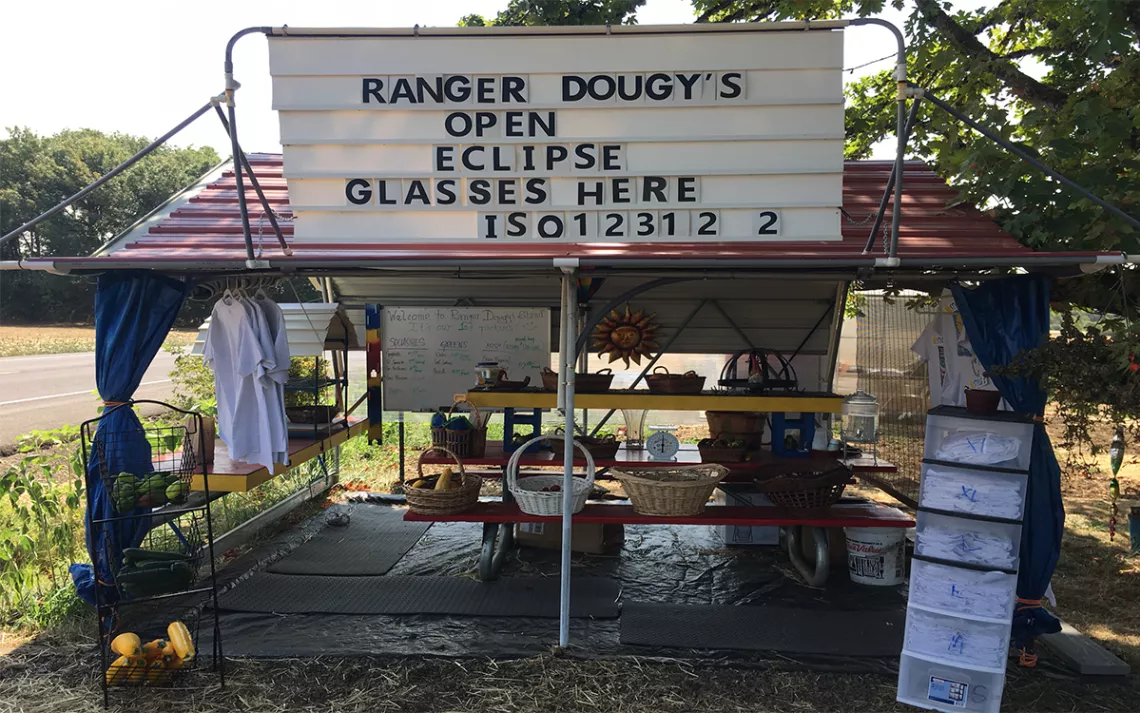
Above and below: Photos by Wendy Becktold
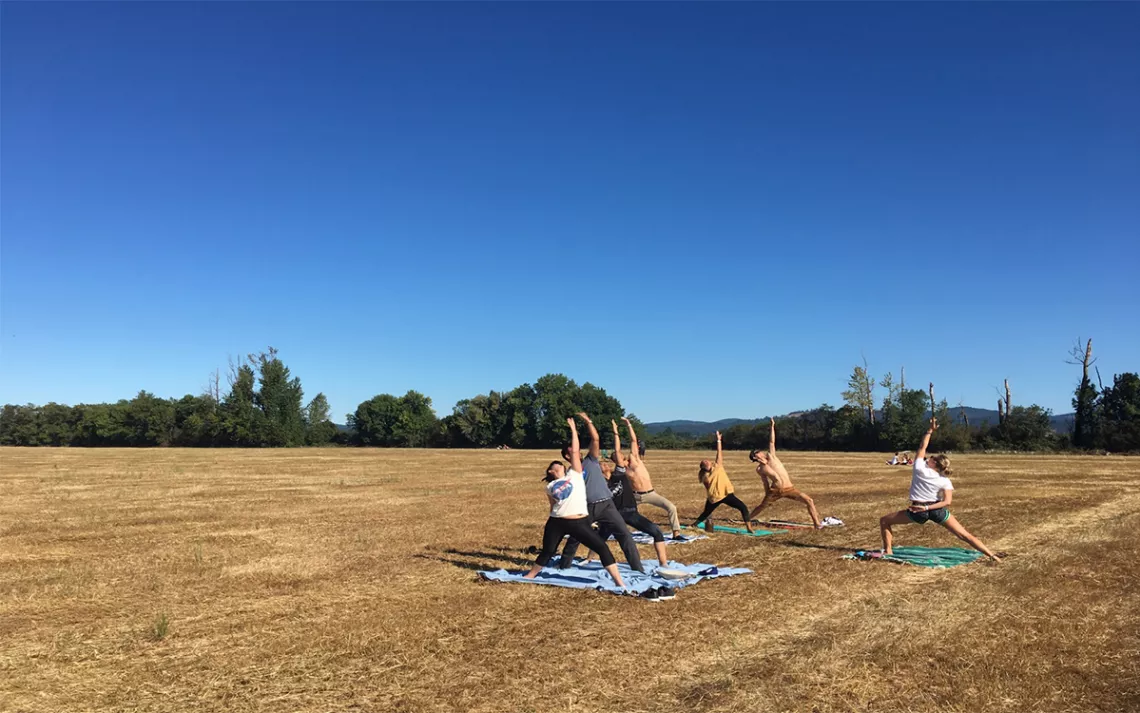
Another fellow camper, Ann Anderson, had traveled with her husband, Glen, from Seattle. They already had plans to vacation in southern Oregon this August when they heard about the eclipse. They had considered going to Madras—totality there lasted nearly two minutes, about 30 seconds longer than at the farm. The city had organized Solarfest and Solar Town; more than 5,000 camping spots were sold.
But when Anderson found the Willamette Westwind Farm online, she knew it was the right choice. “This is so Oregon. A little more earthy. Not so sensationalized,” she said. “Just experiencing the awesomeness of nature is enough. We don’t need to do that with thousands of other people.”
Peter Eberhardt couldn’t have agreed more. A professional cartographer and geographer and amateur astronomer, he gave a quick-hit astronomy 101 talk for campers on both Saturday and Sunday evenings. His enthusiasm was infectious, but while he was excited about the eclipse, his true love is Polaris. He had even invented a Polariscope through which we could spot the North Star. The sun, he explained, is 416 times larger than the moon and 416 times farther away from Earth, which is why, when the moon passes in front of the sun, we see an eclipse. “It’s a huge coincidence!” he told us. “There is nowhere else in the solar system where this phenomenon can be observed!”
*
On Monday morning, campers gathered gradually in the field. Kids ran around tossing footballs and Frisbees. Around 9:15 A.M., a group of seven started doing yoga, just as the moon’s edge crept in front of the sun. It was quiet, without the flourishes of a big festival, but Ann Anderson had been right. This was enough to experience the eclipse on its own terms. It needed no framing.
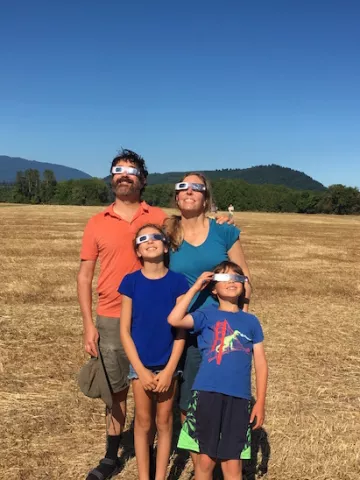
As the moon slowly took bigger chunks out of the sun, I wandered over to a small RV with a telescope set up on a chair. Mary Ellen Barlow and her brother Bill had driven up from Southern California just the night before. She used to work at a planetarium in San Diego, helping produce educational programs for preschoolers all the way up to college students. They had a wizard puppet and an Italian fortune-teller puppet that talked about what they saw in the sky. “The Italian puppet had her way, and the wizard puppet had his,” Mary Ellen explained.
Bill had found the Willamette Westwind Farm online a week ago. On the morning of the eclipse, he showed her photos on his phone of bumper-to-bumper RVs on Mount Hood. “This is so much better,” she said.
Bill gestured to the telescope he had set up. It was projecting an image of the sun onto a piece of cardboard. I took a look: There was the sun reduced to a cartoonlike crescent shape.
By 10:00 A.M., the sky had dimmed, and the air cooled. It was a strange feeling. Like walking into a room and wanting to turn on the lights. Despite our logical understanding of what was happening and why, the moment just before totality felt, well, wrong. Bats and birds flew madly around the sky. The kids drifted in from their play in the face of this peculiar uncertainty.
Then the sun was gone. It looked like dusk, with a swirl of sunset pink on the eastern horizon, the corona shining like a sudden apparition, a ghost hugging the ring of light that was now the sun.
Then it was over, before there was really even time to take it in. The sky lit up as if artificially—a spotlight shining on us from above. I felt the brief urge to cry. The kids dispersed back to their play, or started arguing with their parents. Life resumed as the sun crept back to its normal shape and size.
Later, I asked Fritze what she thought about the experience. “It was beyond my expectation,” she said. “And to experience it with this group of people. . . . It felt like family.”
 The Magazine of The Sierra Club
The Magazine of The Sierra Club
